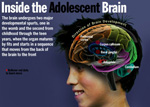The recognized divisions in the life cycle are sometimes known as age grades and very often important ceremonies mark the transition from one age grade to the next.
The rites that mark the passage from being seen as a child to being seen as a young man or woman have been investigated by anthropologists in many societies.
Such rites are very visible and often marked by physical scarring or the subsequent wearing of different clothes. In this way all will know just how anyone may be expected to behave and how in turn they should behave towards those they meet.
In our own society there is much difficulty in knowing when transitions from one age grade to the next do occur.
When those in mourn wore black for a year after their bereavement all knew who were to be treated with consideration as widows.
The problem of knowing just what role a person is playing is particularly difficult in the case of the transition from childhood to adolescence and from adolescence to adulthood. Thus, children become adults at different ages along different dimensions.
A child ceases to pay half are on the railways at fourteen, is an adult as far as driving a car is concerned at seventeen, but may not vote till eighteen, or marry without parental consent till eighteen.
In the last case, however, the age of adulthood is sixteen in other countries, which once again points up the differences that exist between societies in the ages at which a child becomes an adult.
There are big differences in the social definition of the word ‘precocious’ between societies and in its application to various dimensions of behavior.
There are some positions and roles which cannot, or cannot easily, be refused. Those filling these positions must behave as is expected of them.
A very clear example is provided by the sex role. In every known society members must either be male or female and for physiological reasons it is difficult, though not impossible, to pass from one sex to the other.
Another example, based on social rather than physical considerations, is that in a capitalist society a baby cannot avoid being born to parents who belong either to the middle or to the working class.
In societies where social strata have other foundations than class a somewhat similar situation exists and babies are born to be sons of a ruling class or daughters of peasants and so on.
Early, or indeed any, movement away from this inherited position is rare, though possible through the process of adoption.
A final example, relates to roles associated with color of skin; one is born black, yellow or white and in contemporary though not in all societies or even perhaps in all parts of society, certain implications of this accident of birth are hard to escape.
Such roles are termed ascribed by sociologists.
They may be contrasted with roles which are not socially compulsory, but which may be achieved if one is able and so desires. Thus a man is ascribed maleness, but achieves the position of husband.
The future opportunities in life, or in the terms used here, the possible pathways through the social structure open to an individual, are largely determined by the nature of the social positions into which he is put willy-nilly. In other words the roles that he may achieve are in many cases constrained by his roles.
In our society, though this is perhaps not so true of socialist societies, boys have more chance of becoming engineers or bus drivers than do girls, who in their turn are more likely to work as librarians or typists.
There is also a greater probability that children born into the middle class will achieve an occupation of higher status than boys and girls of working-class parents.
Basically these two examples draw our attention to the manner in which the social structure may be seen as providing tracks or pathways through life from which it is very difficult, though not impossible, to deviate.



